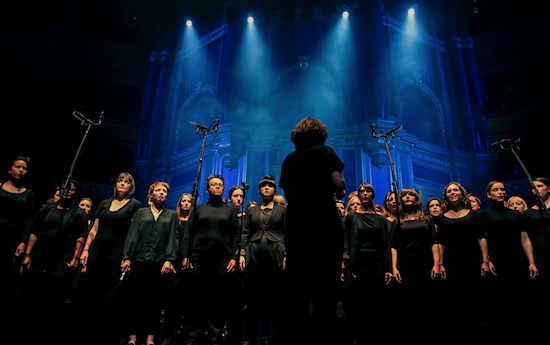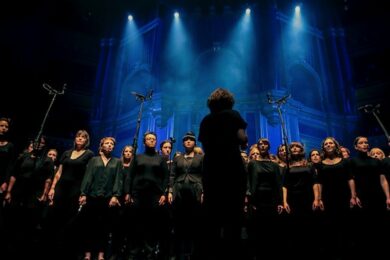A group of 50-odd women dressed in black take to the stage at the Royal Albert Hall at the behest of Alison Goldfrapp. They face the audience, who you sense do not know what to expect, enveloped by a deafening silence.
Rewind an hour or two, and the large backstage bar that has become Lips’s dressing room is buzzing with activity. Some members are high on anticipation, roving around the room, taking pictures, hurling in-jokes at one another; others sit contemplatively, one nuzzled in Donna Tartt’s The Secret History, others idly scrolling the screen of their phone. You can hear slogans bandied about, apparently a tradition before a Lips concert. Today’s is: “No fear, no beauty.”
Lips were formed by friends a little over five years ago. There were 11 budding singers at the first rehearsal, without much classical training behind them. Their raison d’etre was simple: to turn pop music into an empowering, inclusive activity. Now the choir has 70 members; they played this year’s Bestival and Camp Bestival, have recorded albums with Leona Lewis and appeared on Children In Need. They were handpicked by Alison Goldfrapp after she caught them at a gig at Cargo in east London.
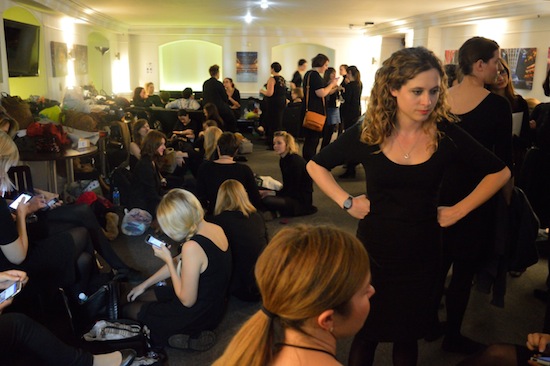
"They are a rare find," says Goldfrapp. "Such great singers with a wonderful musical sensibility." Ahead of the Albert Hall gig, Goldfrapp attended rehearsals in an Islington hall each week, her pet whippet in tow. She would make notes, give hints. It was a test but they came through. It has been a giant leap. Kat Stark (one of Lips’ musical directors along with Jessie Marion Davies and chief executive at the University of West London’s Student Union by day) tells of how mingling with pop stars can feel a bit overwhelming. "Being in the studio with her was along way from the shit pubs in Islington, where we started; but it’s good to be under pressure.."
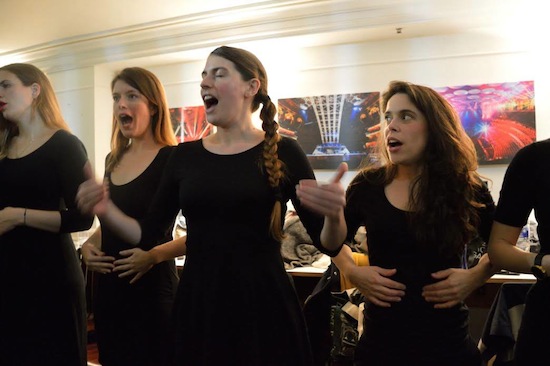
Despite this being the Albert Hall’s backstage booze room, the shutters are down and there’s not a glass bottle in sight. "With us, there’s no drinking before singing," says Geraldine Smith, a project manager and researcher. “We did a gig drunk early on, and it was a disaster. We’re always learning!”Suddenly everyone is called together, and a collective appears, a mass of women in black undertaking breathing exercises and vocal riffs, stretching out around the room.
“There are a lack of female voices out there who are so strong a together," says Freda – one of tonight’s soloists, who joined after looking for a choir that wasn’t religious. She was on the waiting list for a year. Such is the demand to join Lips there is currently a two-year waiting list. The size of the choir is capped a 70 to ensure quality, and that everyone will know each other.
On the Royal Albert Hall stage, the choir begin their rendition of Goldfrapp’s ‘Voicething’, a Reichian piece of avant pop. It’s a magic rendition, floating and urgent, subtle and bare. After this, some members leave the stage while the rest back Goldfrapp through a set that includes hits such as ‘Black Cherry’ that some members might have first sung with the obligatory hairbrush. The inclusion of the choir lifts the concert up, and at the end the 5,000-strong audience are in raptures.
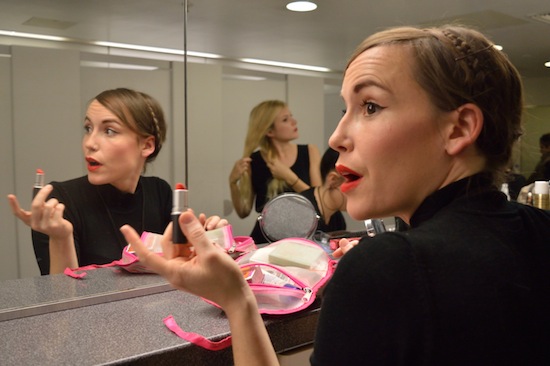
Alison Goldfrapp has carved out a space in the pop milieu that seems to resist the dichotomy of gender, perhaps most evident in her partner Lisa Gunning’s video for ‘Annabel’ a beautiful black-and-white tale of androgyny. Choirs such as Lips similarly create such breathing space: bunkers of safety in Binary Britain, which achieve a kind of spirituality that comes out of community and shared purpose, away from the obfuscating and banal traits of everyday activities in late-capitalist life. We’re long past the days of the choir as the preserve of the church; as C of E-formed habits dwindle ever more, the choir has remained, repurposed for different habits, different desires. There have been an emergence of choirs formed with an empowering streak in recent years, such as Hackney’s Deep Throat, Gaggle, and Manchester Lesbian & Gay Chorus. In Manchester last month, the latter choir staged a mass singalong on the city’s tram network after two young gay men were violently attacked for singing songs from the musical Wicked while travelling on a bus during a night out. The ‘Safe to Sing’ event saw around 80 vocalists take on the songs of Petula Clark and Westside Story.
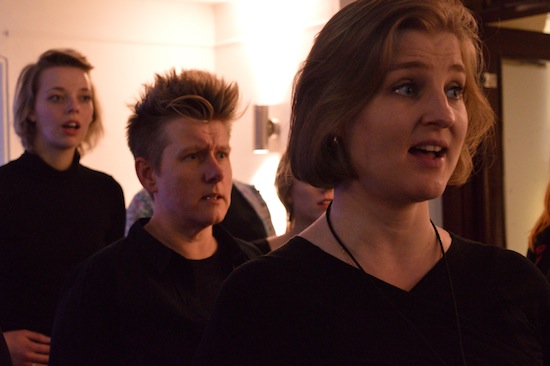
The name Lips itself is subtly provocative; a nuanced, knowing wink of a name for a choir with feminist intentions (whereas Deep Throat kind of riffs on the bludgeoning shock value of the zeitgeist: an off-putting slave to the cult of clickbait). Theirs is a collectivising strategy: a straight-up haven for those who feel threatened by creeping misogyny. I have never felt particularly comfortable with the music industry in terms of its gender norms: based, as it always has been, almost exclusively on male sexuality, male libido. This year it’s got worse. I’ve lost count of the amount of times I have received a press release for an unknown indie band with a female singer up front, dolled up, photoshopped and in hot pants. It seems a requirement for a female musician, even a so-called ‘alternative’ one, to have your legs out at all times. It is in this climate that a choir such as Lips begins to provide the real alternative.
Lips provides a musical space where women can be women and not simply ‘girls’. "Women are expected to get married and have kids," says Sarah Wayman, who works at the Children’s Society. "But there are women who don’t fit within this gender binary. There are lesbians and single people looking for a space that’s not all about being in a couple." The choir go on residential weekends to "hyper-bond," as Wayman puts it. "It’s excellent doing something really creative, embarrassing, getting up and singing together." Around 50 will go away at once, to a youth hostel or to whoever will have them. "We hire out the whole building. Everyone runs around in bras. It’s about solidarity, sisterhood, sharing ideas and language."
Wayman is an old friend of mine from Southend, Essex, and a bestie of my wife Hayley. We were all dragged up through the amyl-nitrate-and-Stella-stained music scene of Junkclub at the Royal Hotel: of the Horrors and These New Puritans and abundant opportunities to dance into the night. Back then in adolescence I don’t think I realised what a different experience Hayley and Sarah were having to me, to no fault of the DJs and promoters who ran the nights. "There was a really strict dress code to a lot of it, a uniform for girls," says Sarah. "You were sneered at if you weren’t wearing the right kind of thing. It was quite stressful, and very gendered." I remember the anxiety of female friends such as Sarah about what they were meant to do within a music scene such as this: "Forming a band wasn’t necessarily what we wanted to do."
Proceeds from this weekend’s ‘Lipsmas’ Christmas special concerts in Marylebone will go to Women Asylum Seekers London, who meet around the corner from Lips. The charity looks after women, many of whom have fled torture or rape, whose lifestyle entails entering and exiting the infamous Yarl’s Wood Immigration Removal Centre, a limbo in which they can earn no money, and so appalling living conditions are inevitable."People need to get angry and take action," says Wayman. "But first you need to build friendship and trust and have fun: a safe place to have a debate."
Step Into Lipsmas is at St Mary’s Church, Marylebone Friday 5th and Saturday 6th December; for more information go here

